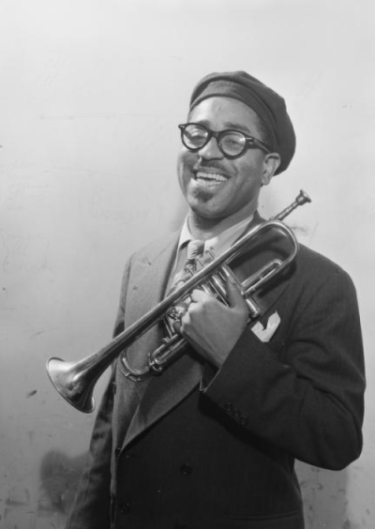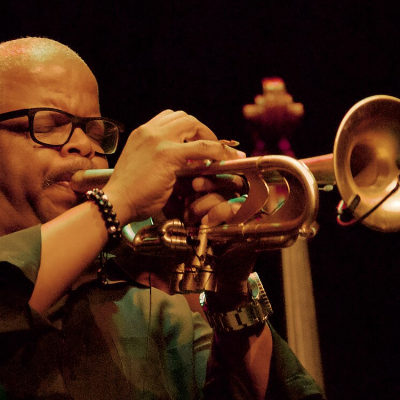.
.
The Sunday Poem is published weekly, and strives to include the poet reading their work.
Dan Thompson reads his poem at its conclusion.
.
.
___
.
.
William P. Gottlieb/Library of Congress

Dizzy Gillespie; May, 1947
.
___
.
The Sound of Surprise
Look at that dude!
BEEP!
Look at his horn!
BOP!
Look at those cheeks!
Salt Peanuts!
POP!
Dear Mister Dizzy,
John Birks Gillespie:
you blew all other trumpeters away
with your Barely Believable Technique –
even Satch.
But popularity?
Well, you did okay.
Not like Pops, but still …
You looked sharp in beret and shades –
your shiny leather two-tone shoes
your almost-always-present soul patch
the once-in-a-while goatee
and the later-in-life colorful clothes –
Outrageous, man!
And your playing?
Outrageous Ability.
You and Bird,
Bud Powell, Kenny Clarke,
Charlie Christian and
Thelonious Monk
gave birth …
First name: Modern.
Last name: Jazz.
Nickname: Bebop.
Salt Peanuts!
You and those other cats up at Minton’s
Groovin’ High in Harlem
were playing only to please yourselves.
At the time – I wonder – were you fully aware
that you were creating
what many today
consider to be
America’s Greatest Art Music?
Modern.
Jazz.
For many people – including Pops –
at first it was Just Plain Weird!
Your early employer – Mr. Cab Calloway –
referred to it as “Chinese Music!” –
so foreign did it appear.
But you and the Bird and those few others
were pushing only against yourselves.
Your own limitations continued to fall
to the advancing line of
men who strive against
only – finally – themselves.
“Genius” is a word too easily thrown around –
yet there it was, at the birth of the modern.
And if you, Mister Diz,
received less attention from
prognosticating priests in print
than the sad and tortured Birdman did,
it may have been due to the fact that Parker
embodied the tragic-Romantic figure –
destroying himself,
dying young in the process.
But that’s the stuff the public loves –
sucking up other people’s grief
as if it’s liquid candy.
And those who were listening
with only their eyes
may well have been
at first
surprised –
misled by your talent
as an entertainer –
your genius inside of a jester’s exterior.
Your trumpet technique exceeded all others’
at the time you first became known –
but the general paying public would never
“cotton to” bebop in the way that folks did
to that New Orleans Dixieland sound –
and even less than they did to swing.
Nor would this art music – “modern jazz” –
that you and Bird and the others were inventing
move beyond the cognoscenti –
aficionados who by definition
will always remain a minority.
And how can minorities ever hold sway
in the Big Bad Market Economy?
True, modern jazz
was popular – sort of –
for a very short
very
short
time.
But rhythm & blues
and rock & roll
would soon enough
wipe clean away
whatever significance
might be claimed
by reference to popular appeal.
The general public’s knowledge of politics
doesn’t surpass its knowledge of music.
In other words:
Democracy sometimes works.
In other words:
Successfully skating
on the always-thin ice
of the “sophisticated popular”
is a gift that is given to the fortunate few
when the planets align
for a limited time.
Those cats who came later –
Ornette and Cecil,
the AACM,
the Art Ensemble of Chicago,
the free-jazzers of the sixties and seventies –
in fact, the whole of the avant-garde experimental
BIG SHEBANG –
found out the hard way that the popular market
would have nothing to do with them.
But you, Diz –
you and the Bird
and the other midwives
were riding high through musical skies
on one of those supremely important
(and very rare)
hinges of history.
In fact, you were the hinge –
straddling the Before and After,
pushing and pulling the public along –
not wanting to leave folks behind, but still …
After Bird’s death,
where did you go next?
Jester Gillespie, you were fond of saying:
To Be or not to Bop –
but the commercial truth was always more like:
To Be or To Bop.
(To Be or Not.)
Realizing you might have trouble finding work
if you rode the experimental road to the end,
you began to change direction …
You chose well
those Caribbean sounds –
reflected in your
(somewhat delayed)
winning of all of the major awards.
You even got President Jimmy Carter –
a one-time small-town peanut farmer –
to sing the words to
Salt Peanuts
when you performed at the White House.
Bespectacled Gillespie
Dizzy Intellectual
The Man with the Horn
with the Bell Bent Upward
Spiritually Interested Jazz Ambassador …
You kept right on exploring –
Cuba Russia Asia Africa
Europe and South America,
then –
after a lifetime of non-stop touring,
grabbed your axe and kept on going.
.
Listen to Dan Thompson read his poem
.
.
___
.
.

Dan Thompson (PhD) is a U.S. Army veteran and former editor and professor whose articles, essays, and poems have been published in scholarly as well as literary journals (including, most recently, the autumn 2024 and winter 2025 issues of Canary, Rat’s Ass Review, and Black Coffee Review). In an earlier life, he worked as a music producer for educational videos; in the audio department of a video, audio, and film production company; and as a disc jockey at a country music radio station.
.
.
Listen to the 1945 performance of the Dizzy Gillespie composition “Groovin’ High,” with Gillespie (trumpet); Charlie Parker (alto saxophone); Clyde Hart (piano); Slam Stewart (bass); Remo Palmieri (guitar); and Cozy Cole (drums). [Universal Music Group]
.
.
___
.
.
Click for:
More poetry on Jerry Jazz Musician
“Saharan Blues on the Seine,” Aishatu Ado’s winning story in the 68th Jerry Jazz Musician Short Fiction Contest
More short fiction on Jerry Jazz Musician
Information about how to submit your poetry or short fiction
Subscribe to the (free) Jerry Jazz Musician quarterly newsletter
Helping to support the ongoing publication of Jerry Jazz Musician, and to keep it commercial-free (thank you!)
.
___
.
.
Jerry Jazz Musician…human produced since 1999
.
.
.



































